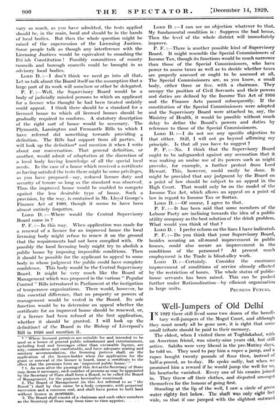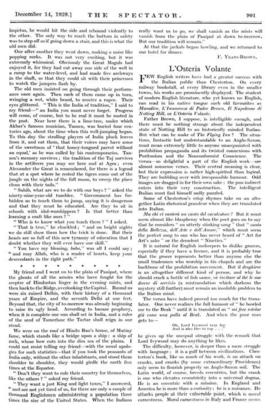Well-Jumpers of Old Delhi
TN 1922 there still lived some two dozen of the heredi- tary tary well-jumpers of the Mogul Court, and although they must nearly all be gone now, it is right that some small tribute should be paid to their memory.
The eldest, when I visited them at- Tughlakabad, with an American friend, was ninety-nine years old, but still active. Sahibs were very liberal in the pre-Mutiny days, he told us. They used to pay him a rupee a jump, and a rupee bought twenty pounds of flour then, instead of half-a-pound, as to-day. He spoke sadly, but when we promised him a reward if he would jump the well for us, his heartache vanished. Every one of his cronies joined in. They threw off their clothes, and disputed amongst themselves for the honour of going first.
Standing at the lip of the well, I saw a circle of green water eighty feet below. The shaft was only eight feet wide, so that if one jumped with the slightest outward impetus, he would hit the side and rebound violently to the other. The only way to reach the bottom in safety was to step off as if going down a stair, and this is what the old men did.
One after another they went down, making a noise like popping corks. It was not very exciting, but it was extremely whimsical. Obviously the Great Moguls had enjoyed it, for they had cut away one side of the well in a ramp to the water-level, and had made five archways in the shaft, so that they could sit with their princesses to watch the jumpers flash by.
The old men insisted on going through their perform- ance once again. Then each of them came up in turn, wringing a wet, white beard, to receive a rupee. Their eyes glittered. " This is the India of tradition," I said to my friend—" an India you must never forget. Progress will come; of course, but to be real it must be rooted in the past. Near here there is a lime-tree, under which Akbar's famous musician, Tansen, was buried four cen- turies ago, about the time when this well-jumping began. To this day the strolling players of India pluck leaves from it, and eat them, that their voices may have some of the sweetness of ' that honey-tongued parrot without an equal,' as he was called by his contemporaries. Tan- sen's memory survives ; the tradition of the Taj survives in the artificers you may see here and at Agra ; even Alexander the Great is remembered, for there is a legend that at a spot where he rested the tigers come out of the jungle on the nights of the full moon, to sweep the place clean with their tails."
" Sahib, what are we to do with our boys ? " asked the ninety-nine-year-old tumbler. " Government has for- bidden us to teach them to jump, saying it is dangerous and that they must be educated. Are they to sit in schools with idol-worshippers ? Is that better than learning a craft like ours ? "
" Who is to know what you teach them ? " I asked.
" That is true," he chuckled ; " and on bright nights we do still show them how the trick is done. But their heads are so full of this new tyranny of education that I doubt whether they will ever have our skill."
" You have my blessing, baba," was all I could say ; " and may Allah, who is a reader of hearts, keep your descendants in the right path."
* * * * * * * My friend and I went on to the plain of Panipat, where the ghosts of all the armies who have fought for the sceptre of Hindustan linger in the evening mists, and then back to the Ridge, overlooking the Capital. Round us were six ruined Delhis, with their history of a thousand years of Empire, and the seventh Delhi at our feet. Beyond that, the city of to-morrow was already beginning to raise its ugly head. According to bazaar prophecy, when it is complete our sun shall set in India, and a ruler of the seed of Tamerlane the Tartar shall reign in our stead.
We were on the roof of Hindu Rao's house, of Mutiny fame, which stands Iike a bridge upon a ship : a ship of rock, whose bow cuts into the dim sea of the plains. I could not resist telling my friend—with the usual apolo- gies for such statistics—that if you took the peasants of India only, without the other inhabitants, and stood them shoulder to shoulder, they would girdle the earth five times at the Equator.
" Don't they want to rule their country for themselves, like the others ? " asked my friend.
" They want a just King and light taxes," I answered, " and are not yet tired of us, for there are only a couple of thousand Englishmen administering a population three times the size of the United States. When the Indians really want us to go, we shall vanish as the mists will vanish from the plain of Panipat at dawn to-morrow. But our tradition will remain."
At that the jackals began howling, and we returned to our hotel for dinner.
F. YEATS-BROWN.













































 Previous page
Previous page